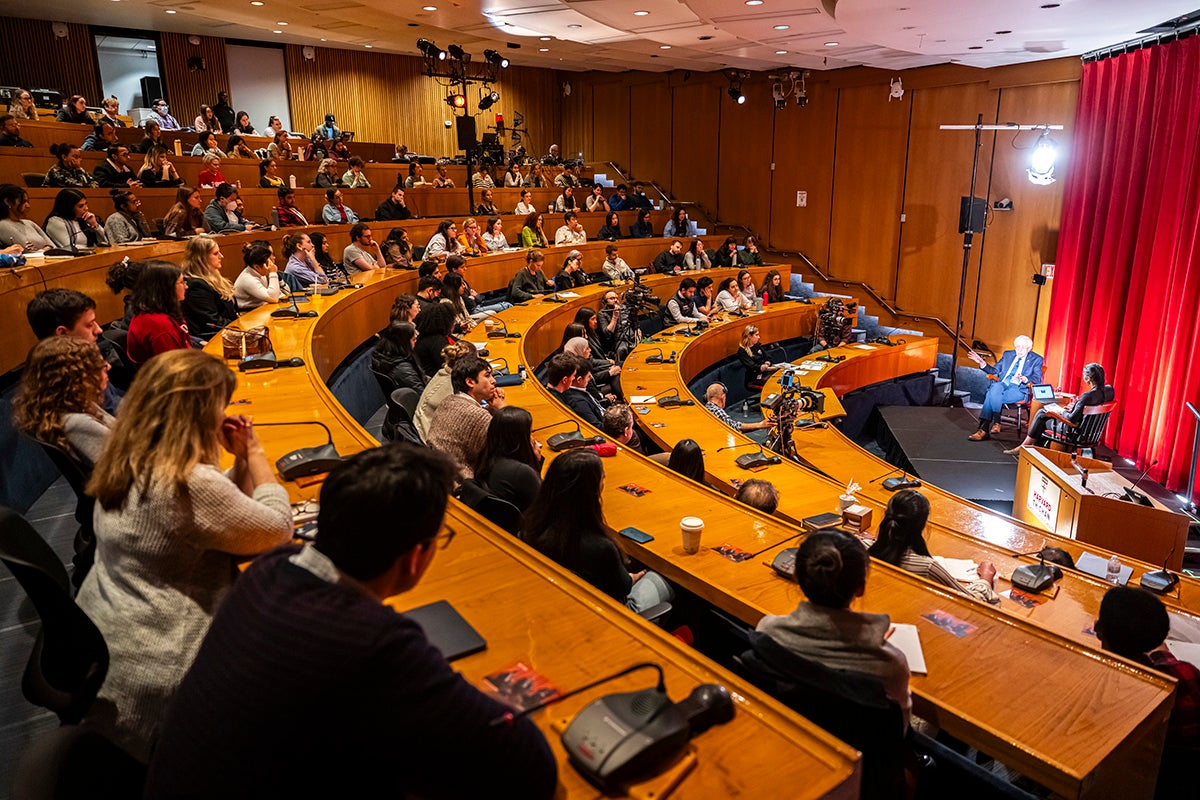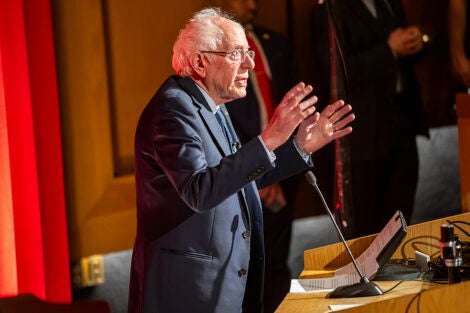April 17, 2024 – The U.S. health care system is “totally broken,” according to Sen. Bernie Sanders.
Speaking to members of the Harvard T.H. Chan School of Public Health community on April 12, Sanders, an Independent senator from Vermont, explained why the system doesn’t work. “It is a system not designed to provide health care to all people in a cost-effective way,” he said. “It is a system designed to make huge profits for the insurance companies, the drug companies, and many other industries within the system.”

Sanders spoke at a Studio event that filled Harvard Chan School’s Kresge Auditorium. The talk, also streamed online, was moderated by Sara Bleich, professor of public health policy at Harvard Chan School and vice provost for special projects at Harvard University.
Outlining the problems plaguing health care in the U.S., Sanders noted that the nation spends $13,000 per person each year on health care—double that of comparable countries—yet has significantly worse health outcomes. Across the country, 85 million people are either uninsured or underinsured. People in the U.S. pay more money for prescription drugs than people anywhere else in the world. And about 60,000 Americans die each year because they can’t get access to health care in a timely way.
The U.S. also lags in life expectancy—and not just compared to other high-income countries. “Our life expectancy is substantially lower than many other countries around the world, including countries like Portugal that spend a fraction of what we spend on health care,” Sanders said. He added, “If you are low-income or working-class in this country, your life expectancy will be 10 years shorter than people who have money. In other words, poverty in America is a death sentence.”
He listed other problems with the system, including crushing amounts of medical debt that cause 500,000 people in America to go bankrupt each year, lack of access to health care in rural areas and rural hospitals shutting down, and a massive mental health crisis.
“All of this to me is almost unbelievable,” Sanders said. “If we were a poor country, it would be explicable. Not in the richest country on earth. … We don’t have enough doctors, nurses, psychiatrists, mental health counselors, dentists. We don’t even have enough pharmacists. We have a major crisis in our public health workforce.”
Medical students, he added, can sometimes face staggering debt for their education that can soar as high as $400,000 to $500,000. Facing such debt, new doctors are more likely to opt for a high-paying specialty rather than a position in primary care in a rural area in need of clinicians.
Sanders called it “insane” that people’s health insurance is typically tied to their employment because it creates a system in which low-wage workers often have substandard health care. And if people lose their jobs—like many did during the pandemic—they may also lose their health care, he said.
‘Health care is a human right’
Long-term, Sanders would like to see a Medicare-for-all single-payer system in the U.S. But he acknowledged that the nation’s current politics don’t favor that kind of large-scale change, and highlighted a plan he proposed with Democratic Senate colleagues calling for expanding Medicare eligibility slowly over time so that it will eventually cover everyone.
He believes that to effectively solve the nation’s health system problems “we must resolve that health care is a human right, not a privilege. The function is to guarantee high-quality health care to all people, regardless of their income, not to make huge profits for insurance companies and drug companies.”
The health care debate, he added, “is not about health care—it’s about economics and about politics and about who gets what. … Can government actually respond to the needs of people who are hurting with regard to health care? Or are we going to continue to fall prey to the power of big money interests?”

In response to a question from Bleich about the high cost of prescription drugs, Sanders suggested possible solutions, with drug companies. Another idea would be to offer drug companies prizes instead of patents—and if they develop successful drugs with the help of NIH-funded research, those drugs should be made available to people everywhere for a negotiated reasonable price, Sanders said.
Bleich also asked about Sanders’ recent proposed legislation for a long COVID “moonshot.” The proposal calls for $10 billion over the next decade for a new long COVID research program at the National Institutes of Health. In addition to the funding, Sander said it’s important to let the 20 million Americans living with long COVID know that “you’re not alone, we understand that your suffering is real.”
At the end of the program, Bleich posed questions to Sanders that had been sent in by students. One student asked Sanders to identify the most critical action people can take now to push for policy change in health care.
“Expose how dysfunctional and wasteful and deadly the system is,” Sanders responded. “We need all of you to understand you’re in a war here, taking on very special interests who could care less whether people live or die. You’ve got to be vocal, and you’ve got to be prepared to take them on.” He added, “In my view, if we work together, I think we can create the kind of country I know we can become.”
Photos: Ben Gebo
